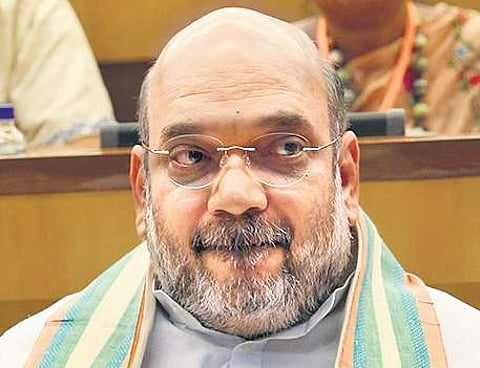

Demonising opponents often backfires when bandwagons capsize unexpectedly. Ask Rahul Gandhi. No Indian politician has been demonised more vituperatively than BJP’s most successful president ever and current Home Minister Amit Shah. His critics, and there are many in the media, Opposition and even in his own party (though super-discreet), paint him as the architect of the Gujarat riots, judicial puppet master, digital stalker, keeper of the caged parrot, EVM manipulator—short of eating small children and conducting human sacrifices during the full moon; they have manufactured Shah’s image as India’s Evil Incarnate. Not even Rasputin or Richelieu have earned such infamy. But he had the last laugh after designing Victory 303 for the BJP. The fear and ire have only escalated since. Where does such hatred among the liberal and centrist circles come from?
Amit Shah is the new Indian power player who has authored the neoteric playbook to redefine politics. The man who is said to own an entire library on Chanakya is not a people pleaser. He appears humourless in public and abjures charm offensives. Many inside and outside the BJP are afraid of him, since he wears power rather heavily on his shoulders. The media hates him because he hates the media, a trait he shares with his guru Prime Minister Narendra Modi.
Having been officially Modi’s closest associate since 2002, Shah became the prime target of journalists crying for his mentor’s blood. The foreign press was even more vicious. Modi was denied a US visa though he was a sitting chief minister. Sonia Gandhi called him ‘maut ka saudagar’, which planted the first seeds of hatred for the Gandhi family in Modi and Shah. The Congress portrayed them as matching Gujarati Slobodan Miloševics who throttle democracy by hateful hook or the bloody crook for power’s sake. But in the state polls that followed the riots, Shah was re-elected from his four-time constituency, Sarkhej, consecutively with an imposing 1,58,000 vote margin. In 2007, the margin was 2,35,000 votes. In his first Lok Sabha election in May, Shah captured Gandhinagar by a record 5.57 lakh votes.
In 2014, when Modi swept India on the development platform, the campaign’s logistical backbone was Amit Shah’s organisational genius. In bitterly divisive 2019, Shah delivered the country to Modi again, bettering the score. Obviously India wanted a break from decades of corruption, dynastic entitlement, minority appeasement, regional disruptors and weak military responses. Modi, now firmly in the saddle and crafting an inclusive Renaissance persona believes the country’s major threat is from terrorism—domestic and foreign. The day of the inclusive patriot has set, and a vigilant nationalist is in charge of South Block. Under Home Minister Amit Shah’s watch, Modi is sure that India is in safe hands, as well as his own place in history.